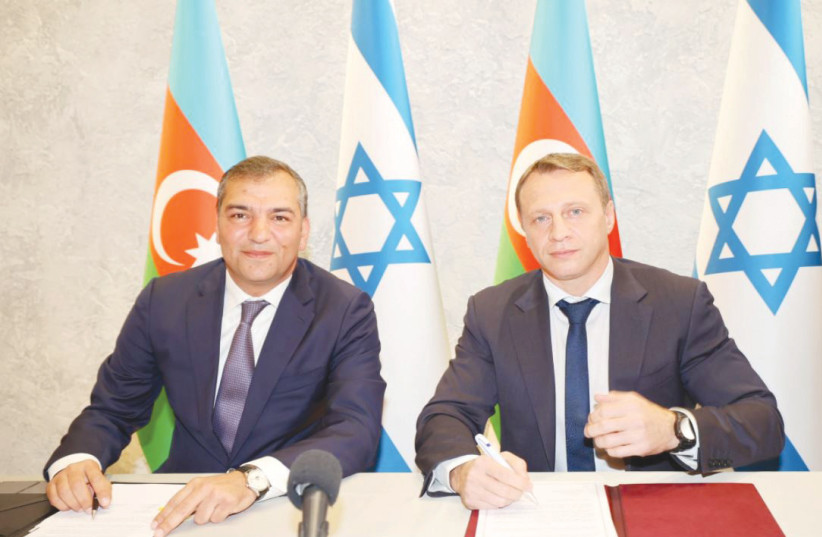Israel and Azerbaijan signed a historic agreement to cooperate on space on Wednesday, the Ministry of Innovation, Science and Technology announced Thursday.
The agreement was signed at the International Astronautical Congress (IAC) held this year in Baku.
"The agreement signed today is further evidence of the strengths of Israeli science, innovation and the space industry," Innovation, Science, and Technology Minister Ofir Akunis said. "Israel's international position is solid and constantly strengthening. The agreement with the Azerbaijan Space Agency has important economic and political implications, and I congratulate everyone who made it a success."
The agreement, explained Uri Oron, director of the Israel Space Agency, will lead to joint projects in the field of space, including the development of space technologies, satellites, space exploration systems from robotics, vehicles, and optical systems, as well as academic collaborations, Earth observation, monitoring, and educational projects.
"The sides expressed their desire to promote bilateral cooperation in the field of exploration and use of outer space for peaceful purposes," a spokesperson for the Azerbaijan embassy in Israel told The Jerusalem Post.

Oron explained that the agreement gives the agencies the legal framework to work together. The first order will be joint research.
Israeli space collaboration
Azerbaijan will become one of many countries with which Israel collaborates in space, many on an even bigger scale. Oron said the country has built satellites with the Centre National D'Etudes Spatiales, the French space agency. It also has collaborations with Italy, America's NASA, and Germany, for example.
"Israel has a window of opportunity regarding space," Oron told the Post. "Space [research] is only at its beginning, and much more is achievable. All nations are seeking their way to space. Israel, with its capabilities, has a huge advantage. Such an agreement [with Azerbaijan] exploits Israel's strengths. This agreement is another example of how space is changing our world."
The deal comes almost immediately after the Israel Aerospace Industries (IAI) and Azercosmos, a private Azeri company in the space industry, signed a cooperation agreement for the sale of two of IAI's cutting-edge multi-spectral electro-optical satellites, better than 0.5-meter native resolution with a long life span and high imaging performance.
The Azeri embassy said of the IAI deal that "this landmark deal represents a significant step forward in space technology and cooperation between the two companies. Under the terms of the agreement, IAI will provide Azercosmos with two satellites within the Azersky -2 program, technology and knowledge for the construction and operation of the satellites.
"The transaction is expected to bring about exciting developments in the field of satellite technology, opening up new opportunities for both companies to explore," the embassy continued. "The agreement includes a long-term business partnership between IAI and Azercosmos, reflected in the establishment of innovation, entrepreneurship, academic and study ecosystem in the field of space in Azerbaijan over the years."
Azersky's satellite program embraces two Earth observation satellites. The first one will be constructed in Israel with Azerbaijani specialists' participation. The second satellite will be built in Azerbaijan.
The ministry's agreement is not with a private company but the government.
The ministry deal, however, comes against the backdrop of scrutiny of Israel's relationship with Azerbaijan in the wake of its September 19 incursion into the disputed territory of Nagorno-Karabakh. Azerbaijan overtook the territory, causing around 100,000 of the region's 120,000 Armenians who occupied the enclave to flee.
In an interview with the Post, Armenian ambassador to Israel Arman Akopian described the events as "classic ethnic cleansing" and highlighted that while Israel is not necessarily anti-Armenian, the country enjoys an exceptionally close cooperation with Azerbaijan and sells the country weapons that have helped it win its wars against Armenia.
"Every time there is an escalation in our region…we know that Azerbaijan's Silk Way Airlines is making frequent flights to Israel to import weapons…[the countries' cooperation] is strong, and it is no secret. It is something both sides declare with pride," Akopian said.
Discreet, but integral
An article published by CNN on Wednesday said that "though their relationship is relatively discreet, Israeli equipment makes up most of Azerbaijan's arms imports, according to arms researchers. Azerbaijani officials touted Israel's weapons as integral to their country's success in Nagorno-Karabakh during the 2020 war."
The 2020 conflict, the Second Nagorno-Karabakh War, occurred in the contested Nagorno-Karabakh region and its neighboring territories. After 44 days, the war resulted in an Azerbaijani victory. The first war took place in 1990.
Oron said the space agency had not received any backlash about the space deal but admitted that "it is a sensitive diplomatic issue."
He said, "Space is part of the diplomatic game."
